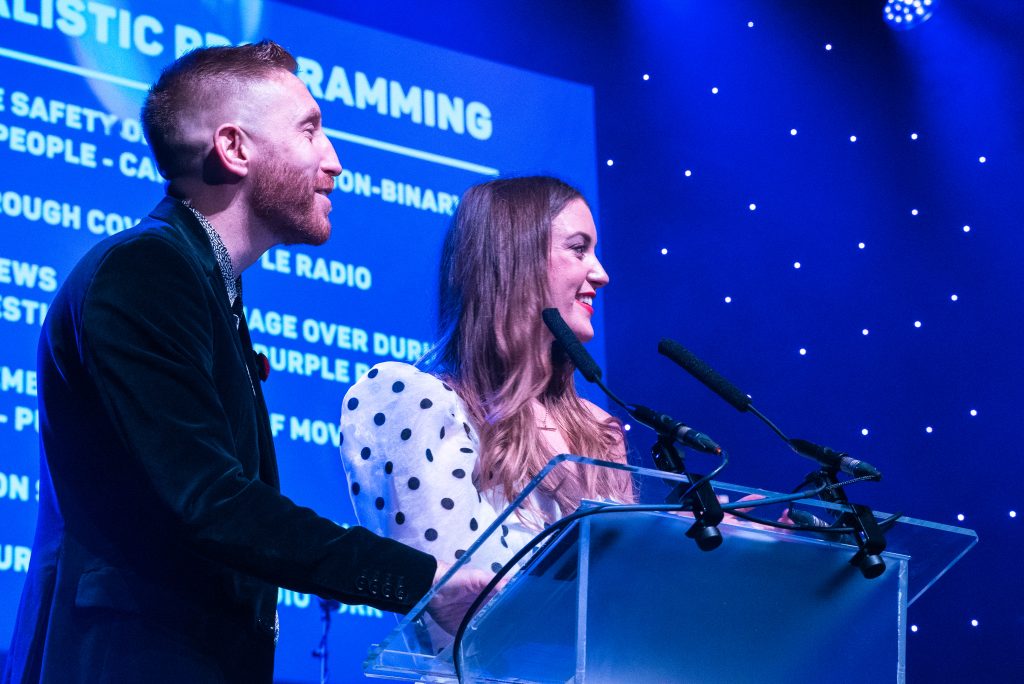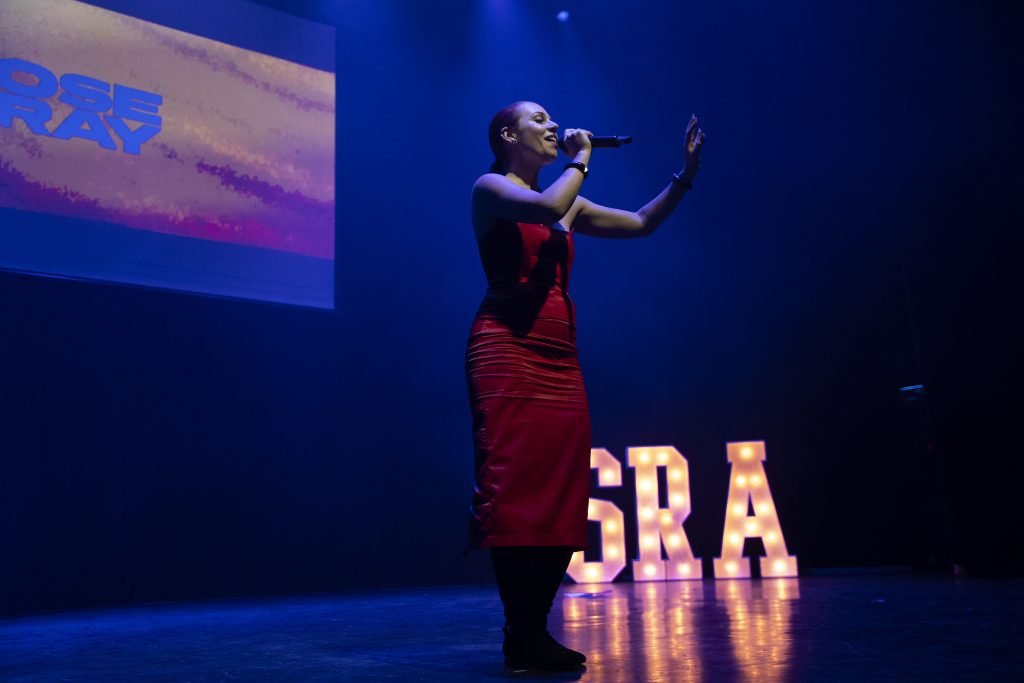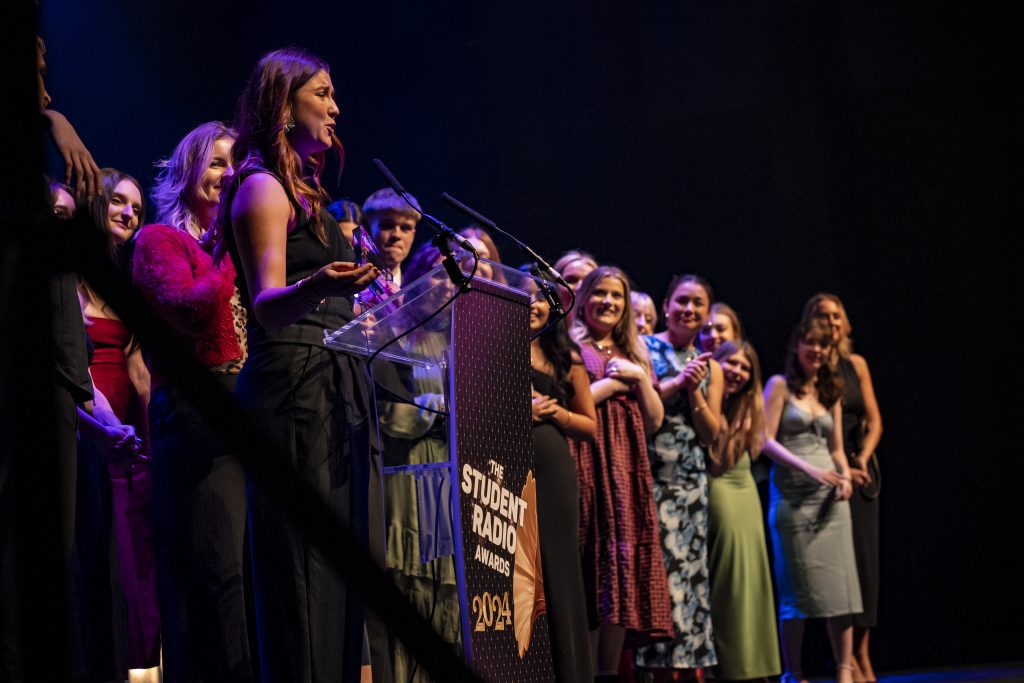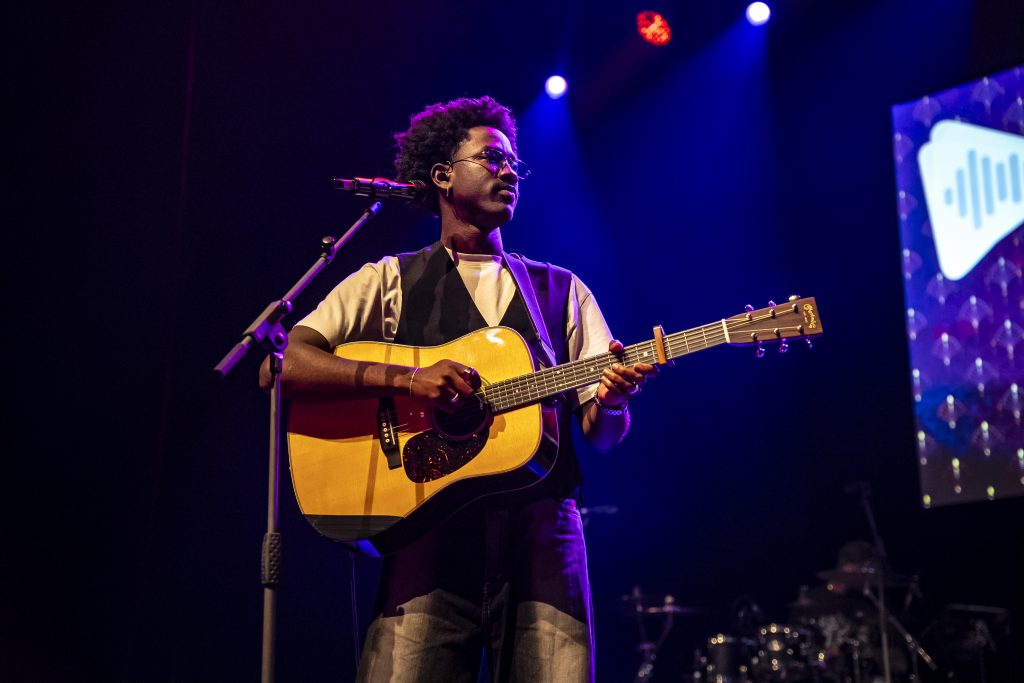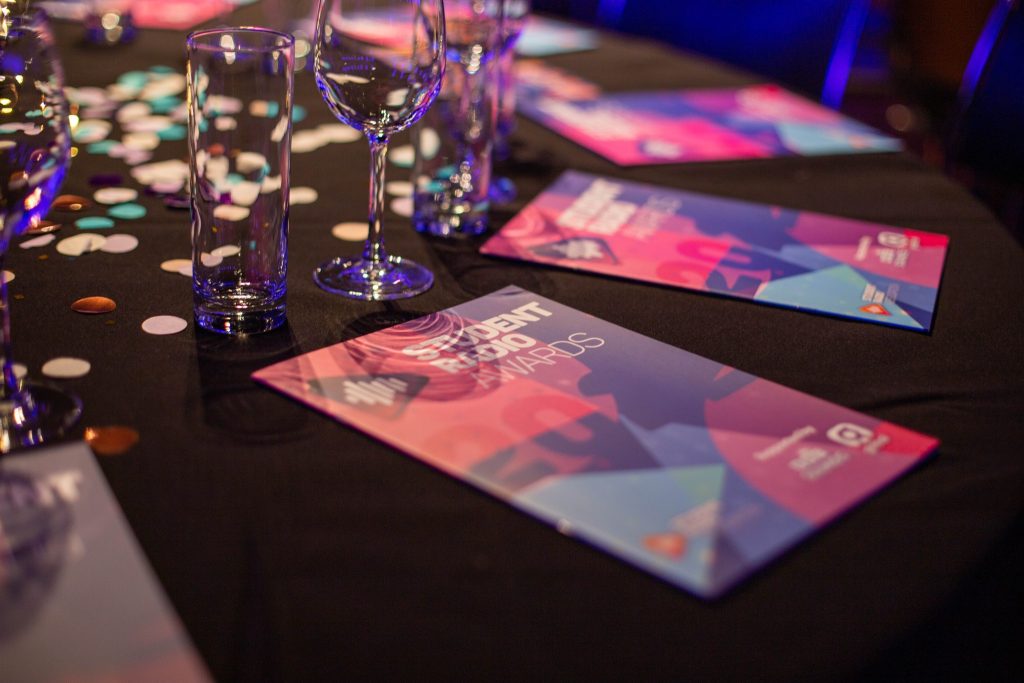
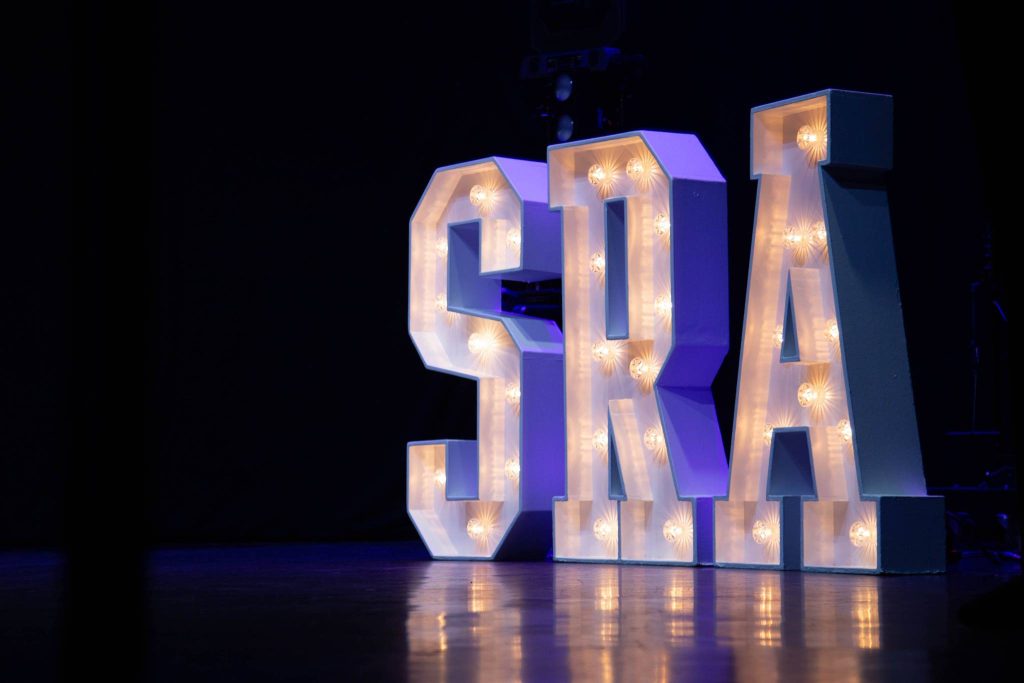

The Student Radio Awards supported by Global and BBC Sounds have been held annually since 1996. It’s a night to celebrate and recognise the achievement and talent in the student radio and audio community.
Judged by nearly two-hundred industry-appointed judges, hundreds of student entries, spanning over a dozen categories, are whittled down to bronze, silver and gold winners.
The ceremony, hosted in the prestigious indigo at The O2 arena in London, is attended by hundreds of students and industry guests, including the biggest names in broadcast talent and senior management from the BBC, commercial and independent networks, media agencies, and companies around the UK.
A glamorous evening of drink and performance, the awards have grown into one of the biggest awards in the media world, and have developed into one of the key events in the professional radio calendar.
Headline sponsors, Global and BBC Sounds, are long-time supporters of the SRA and the Awards. Over the years student radio has launched the careers of Jordan North and Greg James to name but a few. The Awards serve both to celebrate the diversity of content and talent in student radio and to help launch the next generation of radio talent into the industry.
Got a question about The Student Radio Awards? Email [email protected]
The Student Radio Awards Toolkit
Learn how the Student Radio Awards work, how to make a great awards entry and hear our past winning entries here…
What makes a good awards entry?
The best bit of advice is to carefully read the details of the category (and read between the lines) to see what it is asking you to include and what it is that the judges are going to be looking for. Then, find your best material which matches with that and put your entry together.
As with any demo, start with your strongest clip. For awards entries, put the second strongest last (to leave a good impression – our judges have to listen to the whole audio file). Highlight your creativity and show what sets you apart from anyone else. Don’t include things like time checks, crunch and rolls, the weather, and bits like that. Basically, do what they tell you to do for Demo Factor, and the feedback from that evening will really help form an award entry.
Make sure that you don’t go even a second over the time limit, and make sure that your audio doesn’t share more than 50% of the same content as any other audio entry that you submit. Every entry should be completely unique, not duplicating entries for different categories. It’s not a great idea anyway, as you want to tailor the content for the category, so copying it across won’t do that.
In the written element, tell the judges the story, give them the context, and show any challenges that you have overcome. Again, the SRAs category details apply to the written entry as much as the audio, and a great audio entry can be undone by a poor write-up. Make use of the words allowed and paint us a picture. For the Amplify Awards, most categories are written only, so you have to illustrate everything in here. The word limits are not huge, so don’t waffle and pack in as much detail as you can. Don’t include any links in here – they can only go into the multimedia links section in categories that allow it.
The biggest advice we can give is to take your time, plan ahead, and don’t leave it until the last minute. Over 50% of all entries are done on deadline day, and over 80% come in over the last two days; a fifth come in during the final hour before the entry window closes. Be prepared, give yourself time to do edits and rewrites, get friends and family to listen to get feedback, and have a really strong entry ready to go. The windows for entry are as long as we can make them and there is not any time built into the schedule to allow for extensions, so don’t miss out by leaving it too late. The longer you have to work on it and the less you have to rush, the better your entry will be.
Past SRAs winners
Best Male Presenter 2019
Best Male Presenter 2018
Matt Hallsworth - Best Presenter 2024
All Things Alt - Best Entertainment 2024
Rainbow R!ot - Best Specialist Music 2024
Leeds Student Radio - Best Station 2024
How the Student Radio Association's awards are judged
Our judging process for the Student Radio Awards and the Amplify Awards follow the same basic process, with only a few minor differences. Here’s a little explainer on how the judging process works and the way in which we decide our winners:
The competition side of the awards are looked after by the Judging Coordinators (JCs). They sit outside the SRA team and remain completely independent, with a sole focus on running the competition element and ensuring the sanctity of this competition. This means that the SRA Executive Team has absolutely no input or influence over the results.
The Judging Coordination team recruits judges. These are always industry experts, who cannot have been members of Student Radio stations within the last two years or an officer of the Student Radio Association during the preceding 12 months. The JCs aim to have as wide a range of judges as possible from as diverse a background as possible, with great appreciation to our judges for volunteering their time and expertise.
Once the entry period has finished, the JCs carry out their initial legality checks. This is to ensure that all entries conform to the rules of the competition. It is worth noting that if an entry is disqualified due to breaking the rules, the entry fee for the Student Radio Awards is still applicable (there is no entry fee for the Amplify Awards). The main elements that are checked here is that there is no duplication amongst entries, no attempts to circumvent the word count, no links included where links are not permitted, and that the audio has not gone over the time limit. After the checks, the judging can begin.
Each judge is assigned a category – ideally one that they identify as confident in judging. Once assigned a category, the judges will be assigned their entries. The assignment of entries is done entirely by random; judges can highlight if any conflict of interest comes up, but will still score the entry – the JCs will review any conflicts to determine if the score is fair and allowed to stand. There are limits to the number of entries a judge can see, but no limit to the number of times an entry can be seen. Each entry will be viewed by a minimum of two judges, but the aim is to have as many eyes on each entry as possible.
The judges score each entry on five criteria. These are not publicly shared and remain confidential, to help ensure the competition remains fair. However, the criteria are all taken from the descriptions of the categories as shown on the award platform, so the information is available if not explicitly stated. Each category has different criteria, and each criterium is scored out of ten. There is an additional element that is the same for all categories, which is an Entry Strength score given out of three. This is for the judges discretion to use when an entry may not necessarily do well on the criteria but is worthy of a higher mark, or to emphasise a really good entry. As a result, each judge will end up giving a score out of 53.
The scores from all of the judges of a particular entry are then averaged, and the results are made based on this average score. In the event of tiebreaks, the first port of call is that the JCs will take the Entry Strength score out of the tied entries, giving the higher placing to whichever has met the criteria the better. If this does not separate the scores, then individual scores from judges are considered. If the same judge has viewed both, then their high score comes out on top; if not, the highest scores for each entry are considered. If the scores are still tied, both will be reviewed by the Head Judge (normally, but not always, one of the JCs), and they will decide which will get the higher placing based on the criteria of the category.
For the Student Radio Awards, all judges will leave a comment on every entry that they read, to provide feedback which can be read following the Awards night (available from the following morning until the end of December). No feedback is left for the Amplify Awards.
The other comments that judges can leave are to nominate an entry for the Kevin Greening Award for Creativity at the Student Radio Awards or the Amplify Award at the Amplify Awards. There is no set criteria for these categories; rather, they are judged on an individual basis and ranked on their creativity/demonstration of student radio values. These categories are judged by the Judging Coordinators.
When the scores have been completed, the top 6 results are subjected to a second legality check, to double check compliance on the earlier elements as well as confirming that entries have been paid and that a membership is valid. These results are then passed onto the SRA team to organise the ceremonies.
Best Newcomer – Supported by BBC Asian Network
GOLD Helen Lumsdon – TU Xtra
SILVER Alfie Mulcahy – Shock Radio
BRONZE Jonathan McBride – Queen’s Radio
Best Multiplatform Initiative – Supported by Capital’s Jingle Bell Ball
GOLD Charity Week in Aid of Coventry Foodbank – RAW 1251AM
SILVER The Round The Clock Radio Challenge 2: The Big Music Quiz 2 – SRA South Region
BRONZE The Comedy Campsite: Festival Edition – Shock Radio
Best Technical Achievement – Supported by Aiir
GOLD Opening of the Jesus & ARU Studios – Cam FM
SILVER Studio Refit – Fuse FM
BRONZE Carols at the Minster in 5.1 Surround Sound – University Radio York
Best Station Branding – Supported by Painting Pixels
GOLD University Radio Nottingham
SILVER Fuse FM
BRONZE Leeds Student Radio
Best Station Sound – Supported by Wizz FX
GOLD Insanity Radio 103.2FM
SILVER Cam FM
BRONZE TU Xtra
The Diversity, Equality & Inclusion Award – Supported by News UK
GOLD XpressionFM News – XpressionFM
SILVER The Pregnant Students Bill at Queen’s University Belfast – Queen’s Radio
BRONZE LGBTQ+ History Month – Cam FM
Best Interview – Supported by Pineapple Audio Production
GOLD Nerve Radio at Summer Ball: Badger – Nerve Radio
SILVER Rachel Chinouriri Q&A – Blast Radio
BRONZE Hacker T Dog and Katie Thistleton interview – Bailrigg FM
Best Event Programming – Supported by BBC Nations
GOLD The LSR x URY Presenter Hunt – Leeds Student Radio and University Radio York
SILVER Nerve Radio FM Week: Dylan’s Takeover – Nerve Radio
BRONZE Carols at the Minster – University Radio York
Best Chart Show Programming – Supported by BBC Radio 1
GOLD What The **** is a Chart Show, with Matt and Issy – Shock Radio
SILVER Jess and Joe’s Chart Show – University Radio York
BRONZE Livewire1350
Best Podcast Programming – Supported by BBC Sounds
GOLD CampusCast Podcast – Boom Radio
SILVER URNgasm – University Radio Nottingham
BRONZE Sportsfeed – Purple Radio
The Joe Lyons Award for Best Producer – Supported by Global
GOLD Joshua Dodd – SRA South Region
SILVER Rollie Joe Carney – Spark
BRONZE Fion Cudmore – University Radio York
Best News and Journalistic Programming – Supported by Bauer Media Audio UK
GOLD Insight – RAW 1251AM
SILVER Friday Mornings with Ben Mellor – Fly Live
BRONZE Election Night – University Radio York
Best Specialist Music Programming – Supported by BBC Radio 1Xtra
GOLD Rainbow R!ot – Spark
SILVER All Things Alt – Spark
BRONZE Low Notes with AKA Low – Leeds Student Radio
Best Sport Programming – Supported by talkSPORT
GOLD Lent & May Bumps Commentary – Cam FM
SILVER Nottingham Ice Hockey Varsity 2024 – Fly Live
BRONZE Varsity 2024 – Shock Radio
Best Creative Speech Programming – Supported by talkRADIO
GOLD Glass Children – Spark
SILVER Freshers 3.0 – Xpress Radio
BRONZE The CUT presents GLOSS – Boom Radio
Best Entertainment Programming – Supported by Global
GOLD All Things Alt – Spark
SILVER The Shockmas Yuletide Scare Games – Shock Radio
BRONZE Get Up and Dance – Fly Live
Best Presenter – Supported by BBC Radio 1
GOLD Matt Hallsworth – Shock Radio
SILVER Daisy Cox – Cam FM
BRONZE Tom Foreman – University Radio York
Best Student Radio Station – Supported by Global
GOLD Leeds Student Radio
SILVER University Radio York
BRONZE Shock Radio
Sponsoring The Student Radio Awards


The Student Radio Awards supported by headline sponsors, BBC Sounds and Global
To allow students and young professionals an equal opportunity to attend, admission prices are kept lower than cost, and the SRA finances the event through our generous sponsors.
The ceremony, along with the publicity and associated events offers a great platform for brands to reach a wide demographic stretching from university students to on-air talent and national radio network management.
Get in touch with [email protected] to discuss sponsorship packages.

